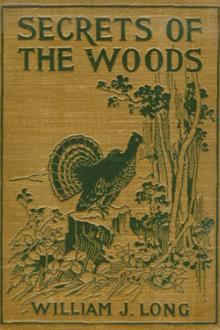author - "William J. Long"

never troubles the poultry of the farms nearest her den. She will forage for miles in every direction; will harass the chickens of distant farms till scarcely a handful remains of those that wander into the woods, or sleep in the open yards; yet she will pass by and through nearer farms without turning aside to hunt, except for mice and frogs; and, even when hungry, will note a flock of chickens within sight of her den, and leave them undisturbed. She seems to know perfectly that a few missing

under the moss, straight to her nest beneath the stone.Besides these older mice, there were five or six smaller ones, all shy save one, who from the first showed not the slightest fear but came straight to my hand, ate his crumbs, and went up my sleeve, and proceeded to make himself a warm nest there by nibbling wool from my flannel shirt. In strong contrast to this little fellow was another who knew too well what fear meant. He belonged to another tribe that had not yet grown accustomed to

the delicate curvesof the shell reflect sounds and harmonies too faint to be otherwisenoticed. A hundred men may pass a hayfield and see only the sweaty toil andthe windrows of dried grass; but here is one who pauses by a Roumanianmeadow, where girls are making hay and singing as they work. He looksdeeper, sees truth and beauty where we see only dead grass, and he reflectswhat he sees in a little poem in which the hay tells its own story:Yesterday's flowers am I,And I have drunk my last sweet

never troubles the poultry of the farms nearest her den. She will forage for miles in every direction; will harass the chickens of distant farms till scarcely a handful remains of those that wander into the woods, or sleep in the open yards; yet she will pass by and through nearer farms without turning aside to hunt, except for mice and frogs; and, even when hungry, will note a flock of chickens within sight of her den, and leave them undisturbed. She seems to know perfectly that a few missing

under the moss, straight to her nest beneath the stone.Besides these older mice, there were five or six smaller ones, all shy save one, who from the first showed not the slightest fear but came straight to my hand, ate his crumbs, and went up my sleeve, and proceeded to make himself a warm nest there by nibbling wool from my flannel shirt. In strong contrast to this little fellow was another who knew too well what fear meant. He belonged to another tribe that had not yet grown accustomed to

the delicate curvesof the shell reflect sounds and harmonies too faint to be otherwisenoticed. A hundred men may pass a hayfield and see only the sweaty toil andthe windrows of dried grass; but here is one who pauses by a Roumanianmeadow, where girls are making hay and singing as they work. He looksdeeper, sees truth and beauty where we see only dead grass, and he reflectswhat he sees in a little poem in which the hay tells its own story:Yesterday's flowers am I,And I have drunk my last sweet